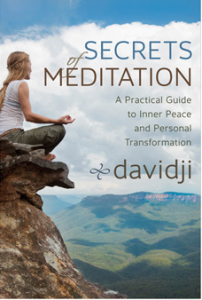 Davidji’s new book “Secrets of Meditation – A Practical Guide to Inner Peace and Personal Transformation” came just at the right time for me. I have been meditating most days since taking a workshop a year and a half ago. But lately I haven’t been as consistent with my practice.
Davidji’s new book “Secrets of Meditation – A Practical Guide to Inner Peace and Personal Transformation” came just at the right time for me. I have been meditating most days since taking a workshop a year and a half ago. But lately I haven’t been as consistent with my practice.
Davidji had his off and on times with meditation, too, as he writes about in the book. “I worked for many years in the world of finance and business amid the wild corporate swirl of New York City,” he recalls. “I had stopped meditating. I had replaced my 5 a.m. meditation ritual with an early morning train ride into the bowels of the World Trade Center, and I had replaced my evening meditation with a double scotch. And like that … poof … my practice had disappeared.”
Thankfully for us Davidji returned to his practice, and in Secrets of Meditation he provides a very thorough treatment of the subject. I liked how he gives an overview of different types of meditation styles (bodymind, visual, sound, energy, sensory, Buddhist, mantra, and chanting in separate chapters devoted to each). After reviewing these styles the reader can decide which one is most appealing and explore that particular method in more depth. Including in many of the chapters are sample exercises to try out different meditation techniques.
“There are thousands of schools and philosophies of meditation. And every school of meditation has its unique technique or way of helping you experience present-moment awareness. I celebrate them all,” Davidji writes. I appreciated how he honors these many varied meditation styles in Secrets, while at the same time saying why he himself practices Primordial Sound Meditation – a technique taught by Chopra Center instructors world wide.
I have come across some conservative Christians who think meditation is dangerous and unbiblical, such as Christian writer Martha West. “Followers of Jesus Christ are not to sit in the lotus pose in an altered state of consciousness seeking the “God within” like pagans do,” West says. Davidji addresses these concerns, too, in his book. “Thousands of my students who are religious – some of them Orthodox Jews, fundamentalist Christians, and devout Muslims – have found that meditating with a mantra has helped them quiet their minds so they can feel even closer to their God,” he writes. “Meditation is simply a tool to help you connect more fully with your most expansive self – the better to feel God’s or the Universe’s love, open yourself to it, and then pour it back into the world.” What can be wrong with that?
I do think the best way to start a meditation practice is to go to a qualified teacher with lessons in person. “Secrets of Meditation” does its best to teach you meditation, but it is only a book. Davidji does offer suggestions for meditation teachers in your area (encouraging readers to contact him).
I found the concluding chapters of “Secrets” to be the best, where Davidji covers topics like “Experiences in Meditation” (what if I fall asleep? That’s OK, he says), the Five Myths of Meditation (“Something special or transcendent is supposed to happen in meditation” is one myth addressed), and Cultivating a Daily Practice (meditating twice a day – first thing in the morning and before your evening meal is one suggestion).
Reading “Secrets of Meditation” gave me many tips to rejuvenate my daily meditation sessions. I recommend it to those who want to start meditating, or who want to enhance their current practice.
You can get “Secrets of Meditation” from these book sellers:
This is another book review in my partnership with Hay House. I was not financially compensated for this post. I received the book from Hay House for review purposes. The opinions are completely my own based on my experience.




Comments
Hello,
I acknowledge and remember that there is both TM (Maharishi’s Transcendental Meditation Program) and PSM (Chopra’s Primordial Sound Meditaiton Program).
I acknowledge that PSM has more mantras for PSM Instructors to select from which are based on a new meditator’s time and place of birth, and that TM has about less than a total of 20 from TM teachers to select from in instructing new TM meditators.
I also acknowledge that there has been lots of research done on specifically TM although none may have been done specifically on PSM.
I acknowledge that the basic goal with both PSM and TM are basically the same.
Yet, even thought many TM meditators are extremely happy with their TM practice, but my desire is this….
I am wishing to ask people who has practiced both TM and PSM for several years, what might be the difference between the two in their personal experiences with both TM and PSM.
Is PSM generally much more deeper in silence than in Maharishi’s TM method??
Please respond back to me and let me know. Thank you very much!
Most Sincerely,
Joe Brooke
Phoenix, Arizona
jaebkee@hotmail.com
Author
Hi Joe – I understand Deepak’s Primordial Sound Meditation (PSM) is similar to TM in that it is a mantra base approach to meditation. I don’t know enough about TM to compare the two. My wife and I like PSM in part because we had a very good instructor (Lisa Guyman) I say try different meditation techniques and go with whatever works best for you (PSM, TM, or a breath oriented meditation). Wishing you the best – Tim